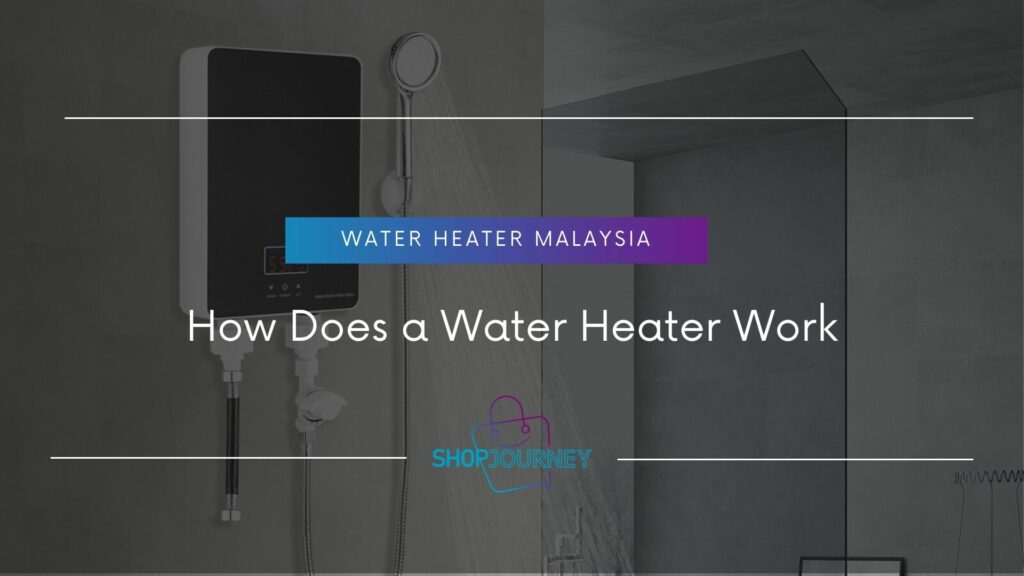Water heaters are an essential appliance in most homes, providing hot water for showers, dishwashing, and laundry. But how do they work? Water heaters operate by heating water in a tank and then distributing it through pipes to various fixtures in the home. There several types of water heaters, so how they work may differ.
How Does a Water Heater Work
Storage Tank Water Heater
A storage tank water heater works by storing and heating a specific amount of water in a large insulated tank. The tank is equipped with a dip tube that feeds cold water from the home’s water lines to the bottom of the tank’s interior, where the water starts to warm up. The heating mechanism, either a burner or an electric heating element, stays on until the water reaches the desired temperature. As the water heats, it rises to the top of the tank, and the heat-out pipe, located near the top of the tank, supplies hot water to the home’s fixtures. The tank is also equipped with a pressure relief valve and a drain valve for maintenance purposes.
Tankless Water Heater
A tankless water heater, also known as an on-demand water heater, heats the water directly as it flows through the unit without storing it in a tank. The unit is equipped with a heat exchanger that heats the water using gas or electricity. When a hot water faucet is turned on, the unit senses the water flow and starts heating the water. Tankless water heaters are more energy-efficient than storage tank water heaters because they only heat the water when it’s needed, which reduces standby heat loss.
Electric Water Heater
An electric water heater works by using electricity to heat the water in the storage tank. The heating element is located at the bottom of the tank, and the thermostat controls the temperature of the water. When the water temperature drops below the set temperature, the heating element turns on and heats the water until it reaches the desired temperature.
Solar Water Heater
A solar water heater uses energy from the sun to heat the water. The system consists of solar collectors, a storage tank, and a circulation pump. The solar collectors absorb the sun’s energy and transfer it to the water in the storage tank, which is then circulated to the home’s fixtures.
Gas Water Heater
A gas water heater uses natural gas or propane to heat the water in the storage tank. The gas burner is located at the bottom of the tank, and the thermostat controls the temperature of the water. When the water temperature drops below the set temperature, the gas burner turns on and heats the water until it reaches the desired temperature.
DC Pump Water Heater
A DC pump water heater is a type of tankless water heater that uses a DC pump to circulate the water through the unit. The unit is equipped with a heating element that heats the water as it flows through the unit. DC pump water heaters are more energy-efficient than traditional tankless water heaters because they use less electricity.
Which Water Heater Is the Best for You?
Household Water Heater Considerations
When considering a household water heater, there are several factors to take into account. One of the most important factors is the size of the water heater. The size of the water heater should be based on the number of people in the household and their hot water usage. A larger family will require a larger water heater to meet their needs.
Another important factor to consider is energy consumption. Both tank and tankless water heaters can be either electric or gas-powered. Electric water heaters tend to be more energy-efficient than gas water heaters, but they can be more expensive to operate. Gas water heaters tend to be less expensive to operate, but they are less energy-efficient.
Efficiency is also an important consideration when choosing a water heater. Tankless water heaters are generally more efficient than tank water heaters because they only heat water as it is needed. This means they do not have to constantly heat and reheat water, which can lead to energy waste. Heat pump water heaters are another option that is highly efficient, as they use electricity to move heat from the air or ground to heat the water.
Commercial Water Heater Requirements
Commercial water heaters are designed to provide a steady supply of hot water for commercial establishments such as restaurants, hotels, and hospitals. The capacity of a commercial water heater is measured in gallons per minute (GPM), which refers to the amount of hot water the heater can produce per minute. The capacity of a commercial water heater is typically much larger than that of a residential water heater, as it needs to be able to handle the high demand for hot water in commercial settings.
To ensure a steady supply of hot water, commercial water heaters must meet certain requirements. For example, they must be able to maintain a consistent temperature and pressure, even when multiple faucets are being used simultaneously. They must also be able to handle heavy usage, as commercial establishments typically use much more hot water than residential homes.
When selecting a commercial water heater, it is important to choose an energy-efficient model. This can help to reduce energy costs and minimize the environmental impact of the heater. One option is to choose a tankless water heater, which heats water on demand rather than storing it in a tank. Another option is to choose a heat exchanger, which transfers heat from one source to another.
In addition to energy efficiency, it is also important to consider the size and type of commercial water heater. Tank water heaters are the most common type of commercial water heater, but they can take up a lot of space and may not be suitable for all settings. Solar water heaters are another option, but they may not be practical in all climates.




